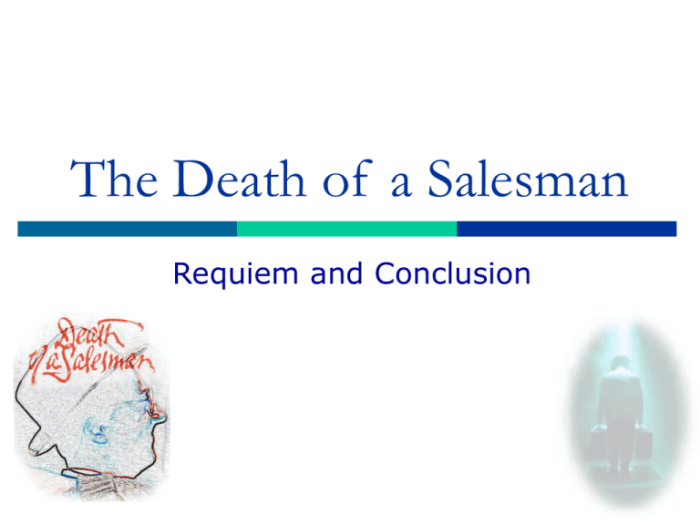Metaphors in death of a salesman – In Arthur Miller’s seminal play, Death of a Salesman, metaphors play a pivotal role in conveying the protagonist’s inner struggles, societal pressures, and the elusive nature of the American Dream. Through a rich tapestry of imagery, Miller invites us to delve into the complexities of Willy Loman’s psyche, examining the profound impact of isolation, failure, and shattered aspirations on his life and relationships.
Metaphors in Death of a Salesman transcend mere literary devices; they become integral to the play’s exploration of the human condition, revealing the profound psychological and emotional turmoil that can arise from the pursuit of unattainable ideals and the weight of societal expectations.
Metaphors in Death of a Salesman

Metaphors play a crucial role in Arthur Miller’s “Death of a Salesman,” enhancing the play’s themes and characterization. By employing metaphors, Miller delves into the protagonist’s inner turmoil, his struggles with failure, and the unattainability of the American Dream.
Metaphors of Isolation

Willy Loman’s sense of isolation is conveyed through metaphors that depict him as a lone wolf or an outsider. For instance, he refers to himself as a “single berry” that has “fallen off the vine.” These metaphors emphasize Willy’s estrangement from his family, his community, and society as a whole.
Metaphors of Failure
Willy’s feelings of inadequacy are symbolized through metaphors that associate him with failure. He sees himself as a “zero” and a “flop,” comparing himself to a “dime a dozen.” These metaphors reflect his struggle to achieve success and his deep-seated belief that he has not lived up to expectations.
Metaphors of Dreams and Reality
The contrast between Willy’s dreams and the harsh realities of his life is highlighted through metaphors. He envisions himself as a successful businessman, living in a “mansion on the lake.” However, these dreams are juxtaposed with his actual circumstances as a struggling salesman who lives in a dilapidated apartment.
This juxtaposition emphasizes the unattainability of Willy’s aspirations and the bitter reality he faces.
Metaphors of the American Dream, Metaphors in death of a salesman
The play critiques the unattainability of the American Dream for certain individuals through metaphors. Willy’s belief in the American Dream is symbolized by the “Green Mansion” he dreams of owning. However, this dream is shattered by the harsh economic realities and social pressures he encounters.
Metaphors of Nature
Natural imagery is used to convey Willy’s emotional state. The “jungle” he often mentions represents the competitive and unforgiving world he feels trapped in. The “rain” and “darkness” symbolize his feelings of despair and isolation. These metaphors enhance the play’s symbolism and atmosphere, reflecting Willy’s inner turmoil and sense of alienation.
Metaphors of the Past and Present
Willy’s past experiences are connected to his present circumstances through metaphors. He recalls a time when he was a “diamond” but now feels like a “piece of glass.” These metaphors reveal the impact of the past on Willy’s present struggles and the tension between memory and reality that haunts him.
Top FAQs
What is the significance of the “jungle” metaphor in Death of a Salesman?
The “jungle” metaphor represents the competitive and unforgiving nature of the business world, where Willy Loman feels lost and overwhelmed.
How do the metaphors of “seeds” and “fertilizer” contribute to the play’s exploration of failure?
Willy’s belief that success is achieved through hard work and determination is symbolized by the “seeds” and “fertilizer” metaphors. However, the failure of his dreams suggests that these metaphors are ultimately false promises.
What is the role of the “American Dream” metaphor in Death of a Salesman?
The “American Dream” metaphor represents the idealized notion of success and prosperity that Willy Loman desperately pursues. However, the play critiques the unattainability of this dream for many individuals, especially those who do not conform to societal norms.
